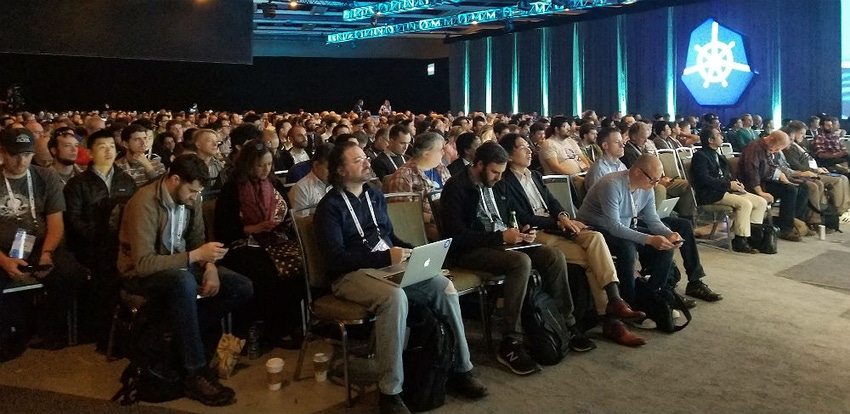It's a move aimed to encourage and accelerate interoperability of applications for businesses and users.
December 12, 2018

(Pictured above: Attendees pack KubeCon at the Washington State Convention Center in Seattle, Dec. 12.)
KUBECON + CLOUDNATIVECON — Software code interoperability without vendor lock-in is the goal of a new effort by two technology organizations, the open-source Linux Foundation and the Joint Development Foundation (JDF), a standards group, that are joining together to help increase the use of open-source standards for business applications.
In an announcement here at the KubeCon + CloudNativeCon North America 2018 conference in Seattle, the two groups said the effort is being fueled by the need for interoperability of applications so business users can always move their data to the platforms that are right for their operations at any time.
The JDF, which was formed in 2015, is a nonprofit that provides a customizable template which can be used by organizations to quickly establish and operate source-code development collaborations. By working with the Linux Foundation (LF), the groups hope to create models that can be used to encourage and popularize standards for new applications and technologies that will promote the idea of data portability for users.

JDF’s David Rudin
“The JDF says, ‘How do we get groups of companies together to iterate on a process that we can all agree on?'” David Rudin, the president of the JDF, told Channel Futures. “Normally, this could be a three- or six- or nine-month process that’s very expensive and time-consuming.”
But with the JDF’s carefully researched and crafted standards template, the process is dramatically simplified and streamlined to make standards collaboration easier, he said.
“Society is based on standards in a wide range of areas,” said Rudin. “How do we all agree what a kilogram is? If we didn’t agree, everything would fall apart. Standards are the traditional way that these things are done.”
The JDF joining the LF is a move that will continue to expand this kind of standardization in the world of open source.
Michael Dolan, the vice president of strategic programs for the LF, told Channel Futures that his organization is excited about promoting new standards among the many open-source projects it nurtures and supports.
“This is significantly important to us,” said Dolan. “There gets to a point where you just need to decide to do things a certain way,” which is where standards can help. In the past, Docker container standards were created to build a standard image format that all projects and vendors can use for their containers.
“By doing that, now we have a layer in the cloud where you can make containers portable from one cloud platform to the next,” said Dolan. “The ability to do that has become much easier.”
For ISVs, developers, users and channel partners, the standards initiatives can provide ripe opportunities for software-platform creation and expansion, said Dolan.

Gartner’s Tony Iams
“You don’t need the giant behemoth companies to create standards,” he said. Instead, interested parties can work with the JDF’s template and negotiate to find common ground.
Tony Iams, an IT analyst with Gartner, said the idea of standards promotion is one that is of great interest to business users in general.
“I would say that with the rise of cloud computing over the past few years, many users are becoming increasingly concerned with the risk of lock-in with cloud services, since migrating or exiting from a cloud service can be costly and time-consuming,” said Iams. “Cloud services are often based on open -ource software, but a service provider will often add proprietary extensions on top of an open-source foundation.”
Under this new standards initiative, the question is whether the JDF will strengthen the Linux Foundation’s ability to establish standards that can be used to define cross-platform compatibility of leading cloud services, said Iams.
Read more about:
AgentsAbout the Author(s)
You May Also Like


